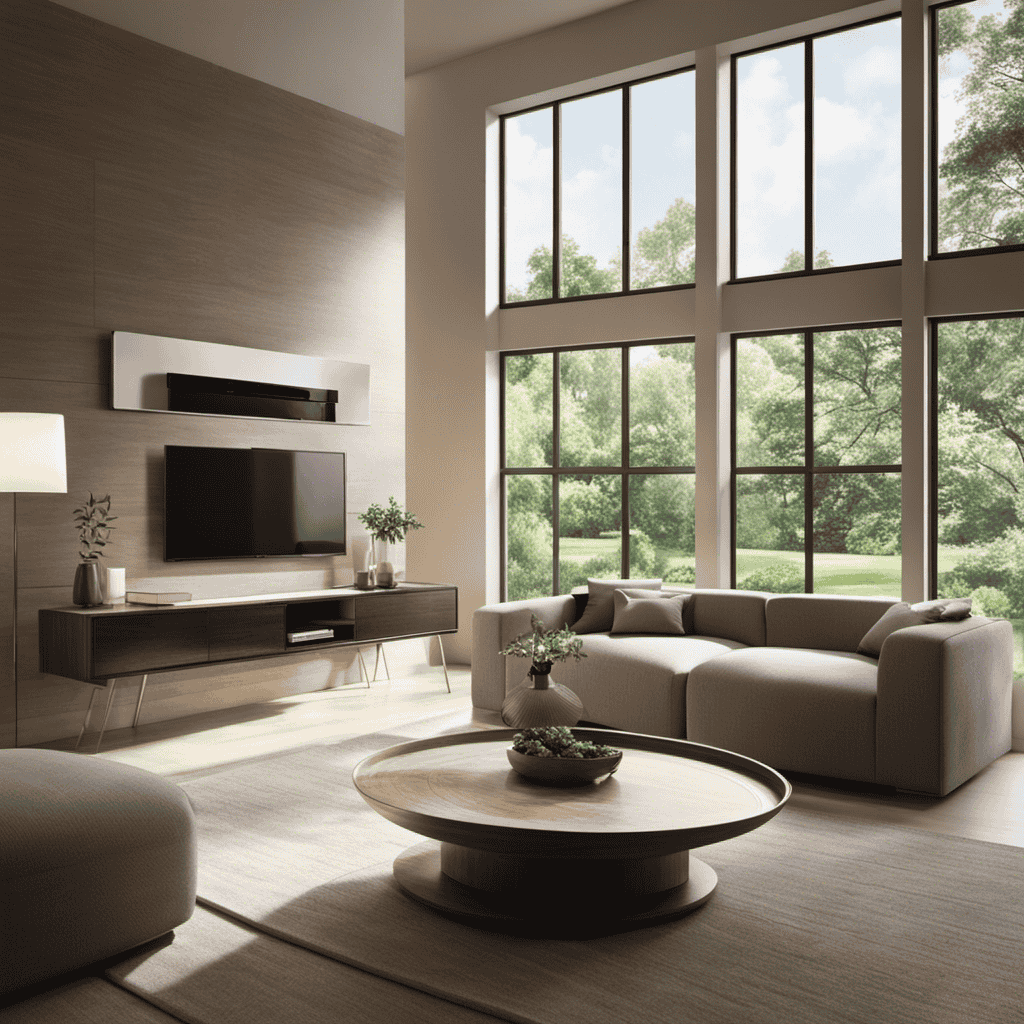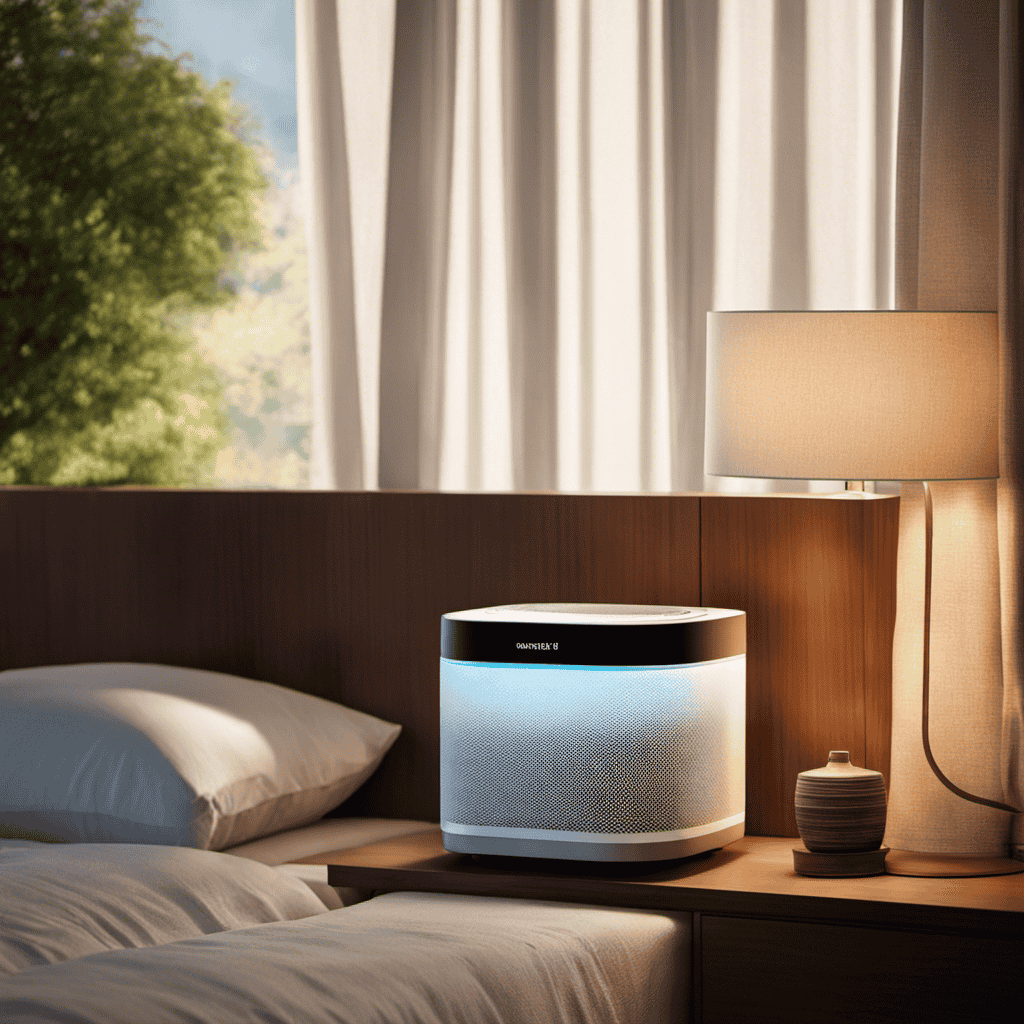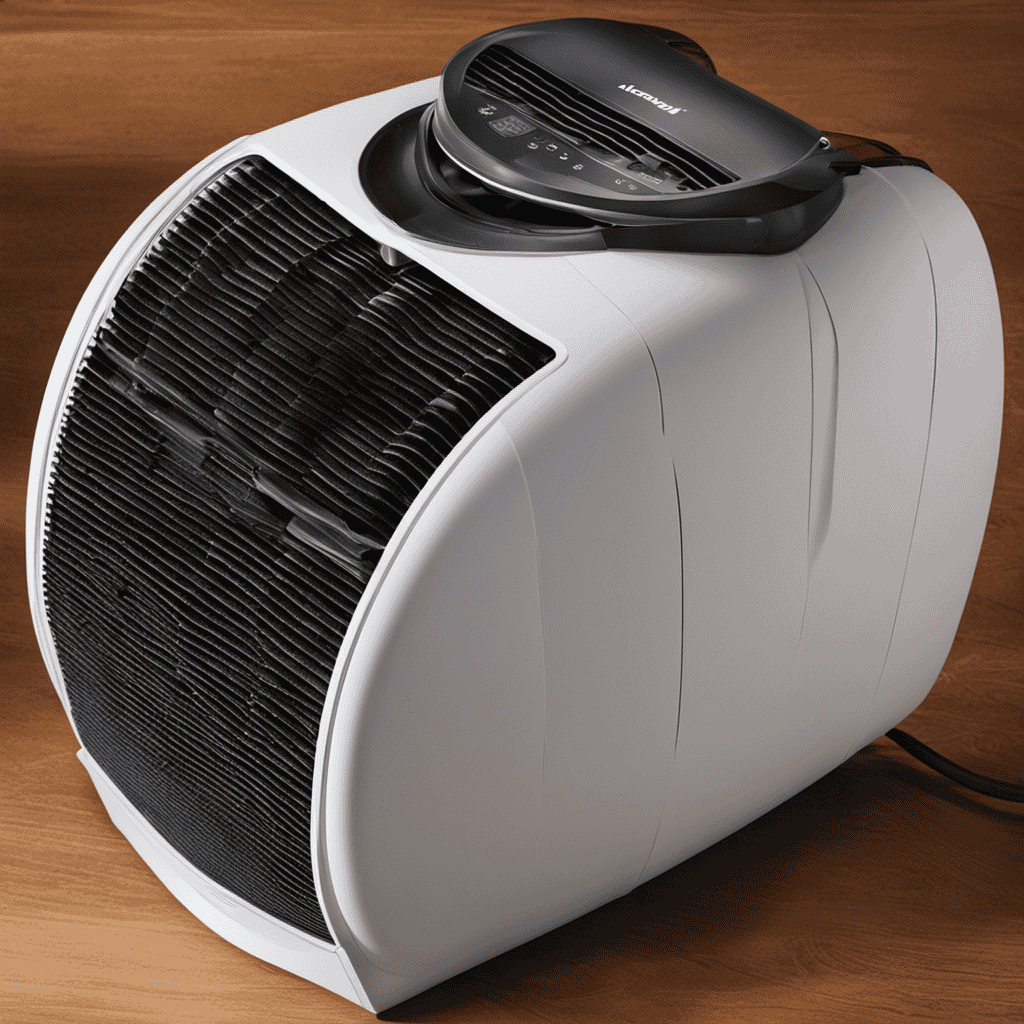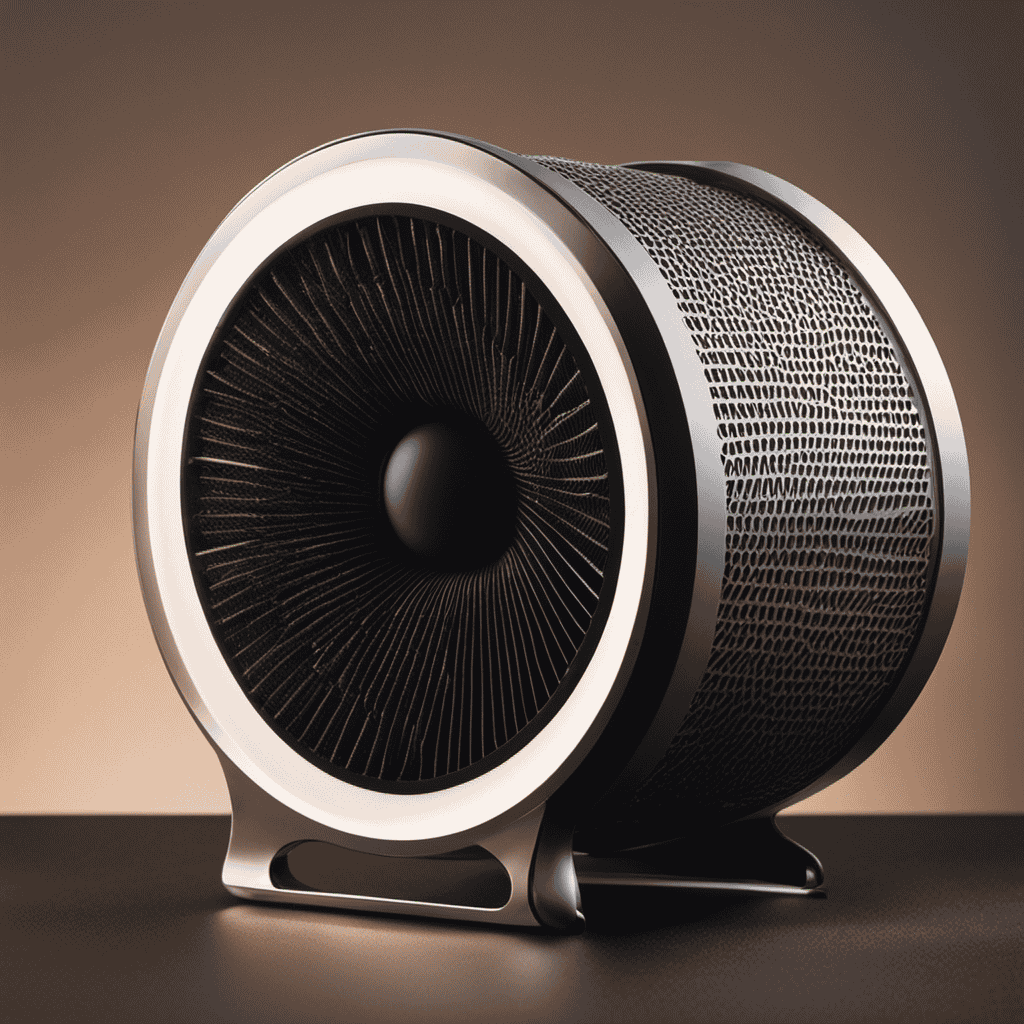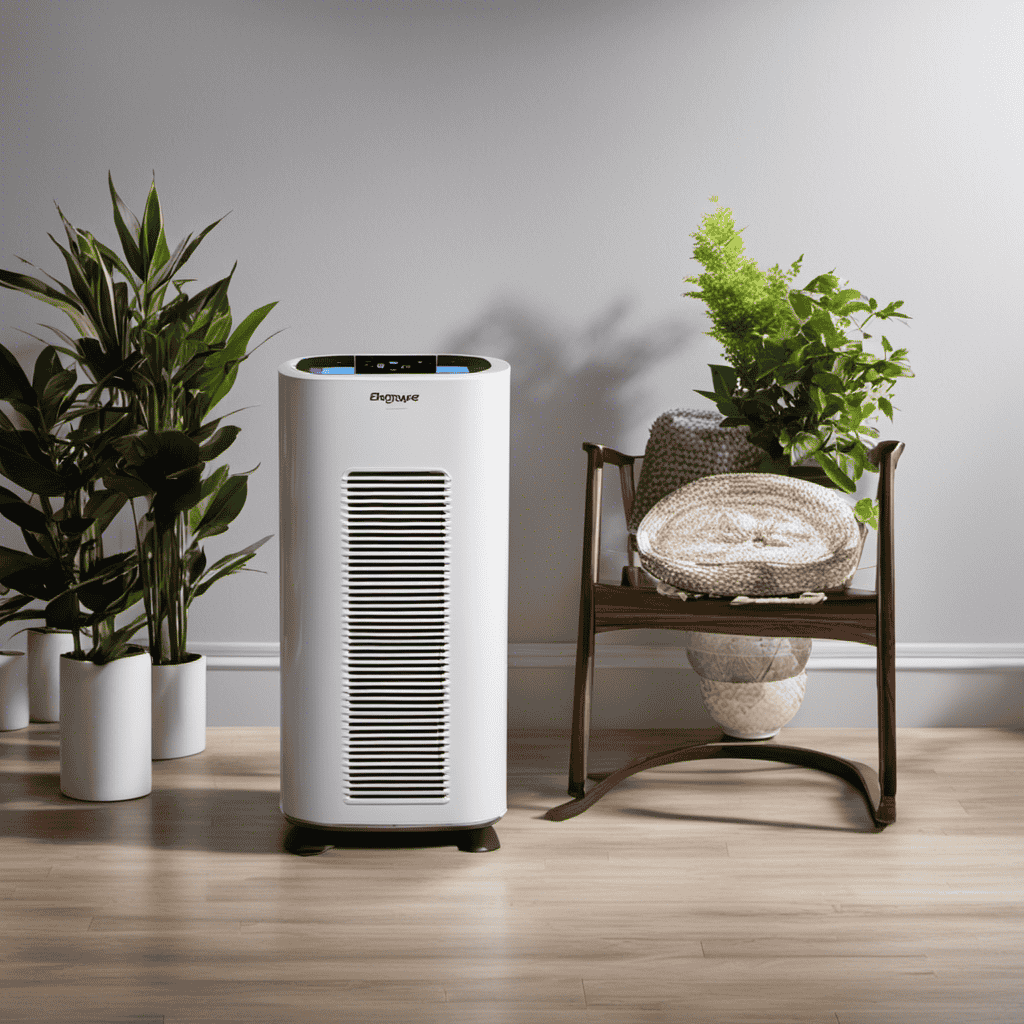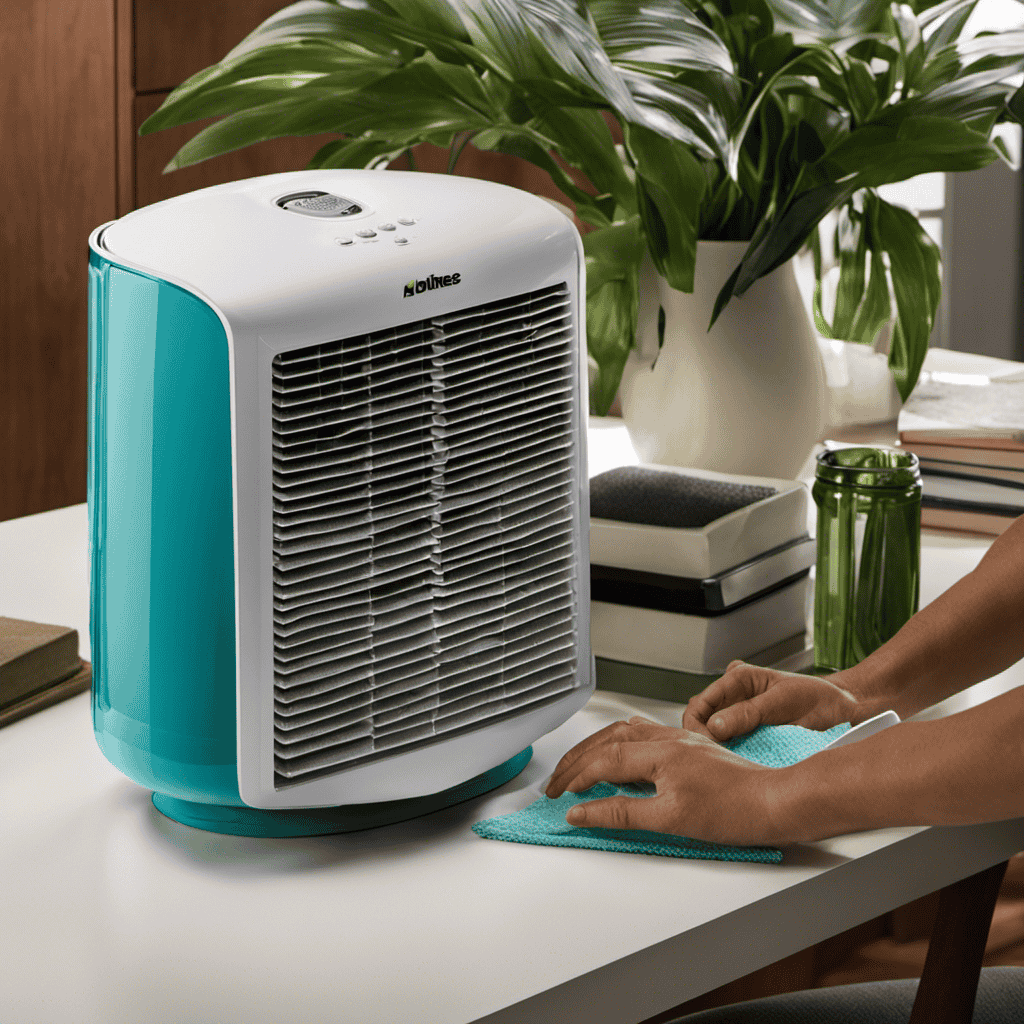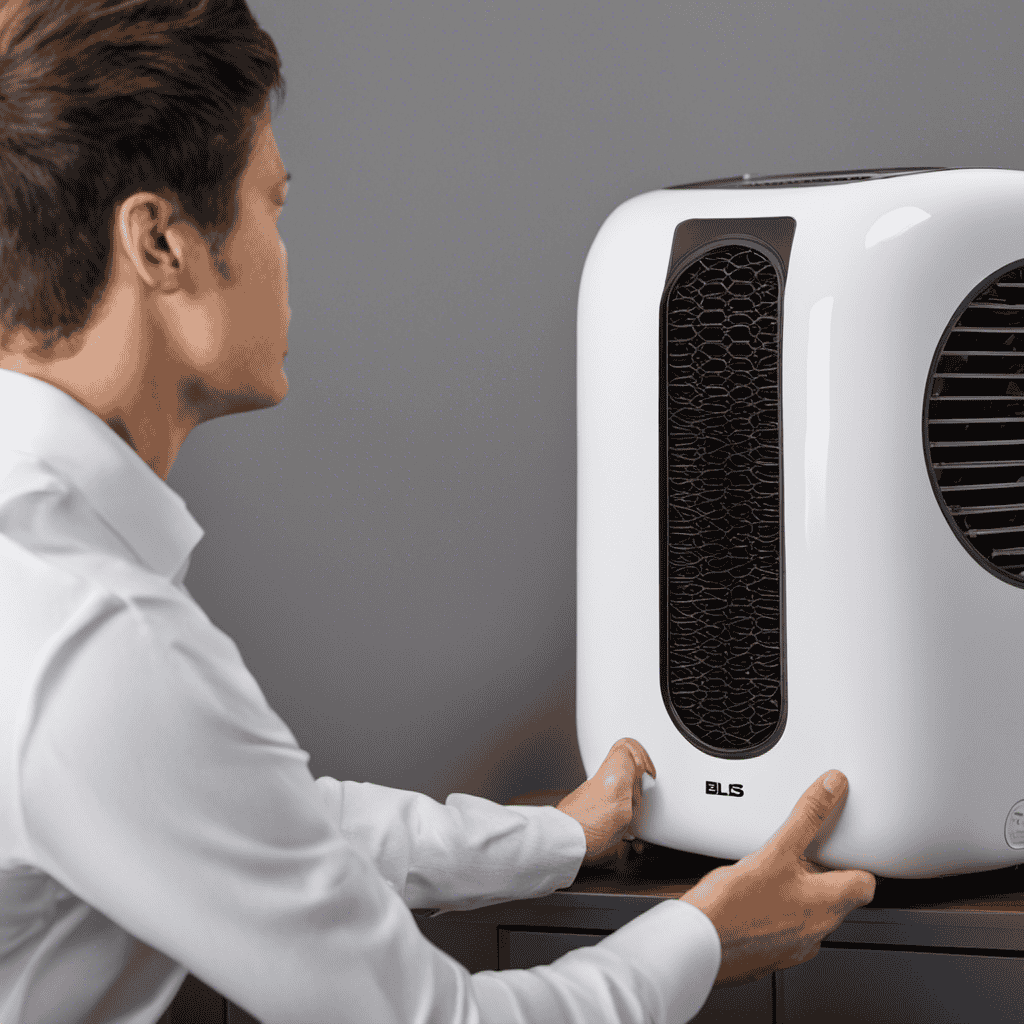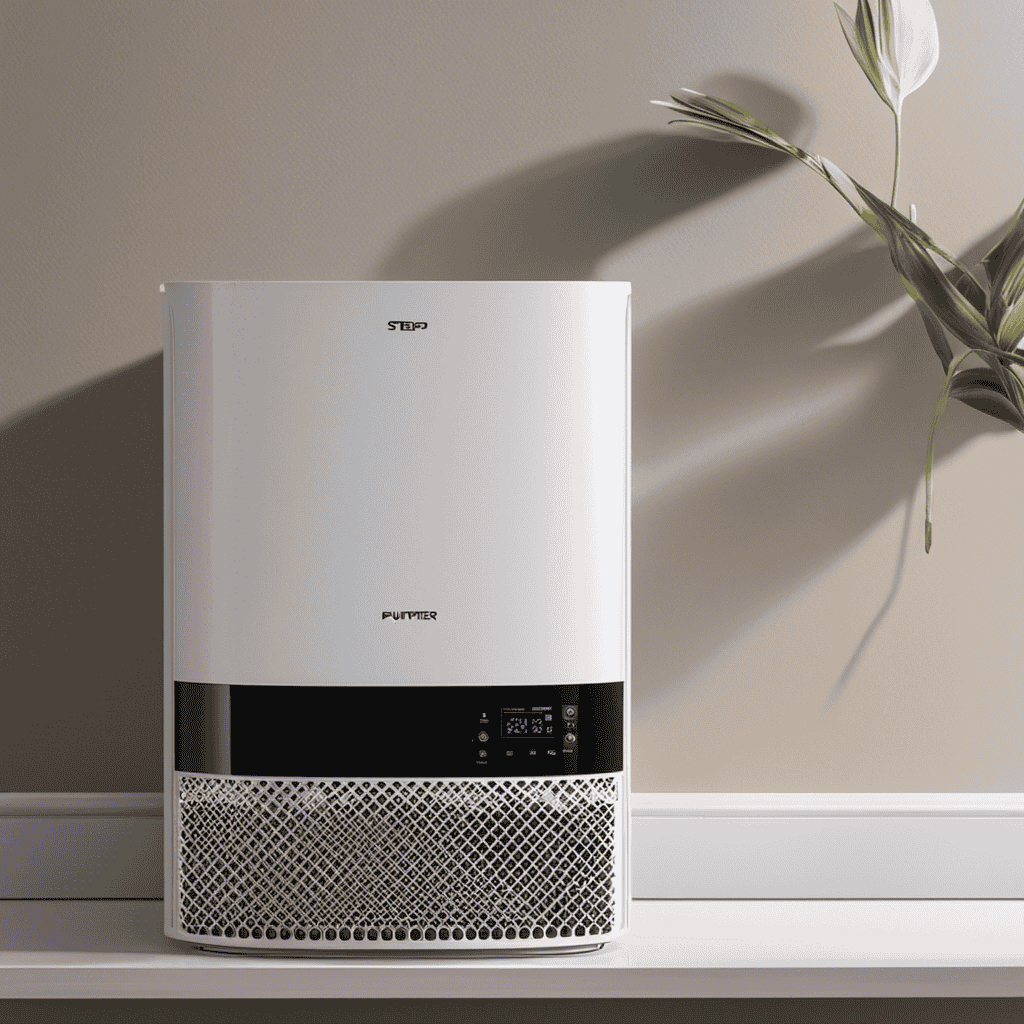I have always been curious about the function and operation of a HEPA air purifier.
After doing some research, I’ve discovered that these devices are designed to remove airborne particles and improve indoor air quality.
HEPA filters, which are used in these purifiers, are incredibly efficient at capturing contaminants like dust, pollen, pet dander, and even bacteria and viruses.
In this article, we’ll delve into the science behind HEPA air purifiers and explore their benefits, as well as provide tips for choosing and maintaining the right one for your home.
Key Takeaways
- HEPA filters are designed to trap and remove particles as small as 0.3 microns from the air.
- HEPA filters can remove common pollutants such as dust, pollen, pet dander, and mold spores.
- HEPA filters have been scientifically proven to improve indoor air quality.
- Using a HEPA air purifier can reduce allergy symptoms, remove bacteria and viruses, and ensure cleaner and healthier indoor air.
The Science Behind HEPA Air Purifiers
HEPA air purifiers are a crucial technology in improving indoor air quality. These purifiers use HEPA filters, which are designed to trap and remove particles as small as 0.3 microns from the air. This includes common pollutants such as dust, pollen, pet dander, and mold spores.
The effectiveness of HEPA filters lies in their unique design. They consist of a dense mesh of fibers that create a maze-like path for air to pass through. As the air flows through the filter, the particles become trapped in the fibers, allowing only clean air to pass through. This filtration process is highly efficient, capturing up to 99.97% of airborne particles.
HEPA filters are particularly effective because of their ability to remove even the smallest particles, including bacteria and viruses. The technology behind HEPA air purifiers has been extensively studied and proven effective in improving indoor air quality. Numerous scientific studies have demonstrated the ability of HEPA filters to reduce allergens and other harmful particles in the air.
Therefore, investing in a HEPA air purifier is a reliable way to ensure cleaner and healthier indoor air.
How HEPA Filters Capture Airborne Particles
To effectively capture airborne particles, you’ll want to understand how HEPA filters work. These filters are highly efficient at capturing particles as small as 0.3 microns, which includes common allergens such as pollen, pet dander, and dust mites. Here’s how HEPA filters do their job:
-
Multiple Layers: HEPA filters consist of multiple layers of fine fibers that create a dense web-like structure. This structure allows the filter to trap particles effectively.
-
Interception: When particles flow through the filter, larger particles get intercepted by the fibers and stick to them. This is known as the interception mechanism.
-
Diffusion: Smaller particles, which are more prone to moving erratically, collide with gas molecules in the filter. This causes them to change direction and get trapped in the fibers, known as the diffusion mechanism.
-
Benefits of HEPA Filtration:
-
Improved Air Quality: HEPA filters can remove up to 99.97% of airborne particles, providing cleaner and healthier air for you to breathe.
-
Allergy Relief: By trapping allergens, HEPA filters can help reduce allergy symptoms, making it easier to live comfortably.
-
Asthma Management: HEPA filtration can also be beneficial for asthma sufferers, as it removes triggers like pollen and dust from the air.
Understanding how HEPA filters work and the benefits they offer can help you make an informed decision about using them in your home or office.
Benefits of Using a HEPA Air Purifier
Using a HEPA air purifier is a highly effective way to remove airborne particles from indoor spaces, improving overall indoor air quality. These filters are designed to capture and trap microscopic particles such as dust, pollen, pet dander, and mold spores, preventing them from recirculating in the air.
With regular use, a HEPA air purifier can greatly reduce allergens and pollutants, providing cleaner and healthier air for individuals and families.
Removes Airborne Particles Effectively
An air purifier can effectively remove airborne particles, helping to improve indoor air quality. With the multitude of air purifiers available on the market, it is important to choose one that best suits your needs.
Here are three key factors to consider when selecting an air purifier:
-
Filter type: Look for an air purifier with a HEPA filter, as it is highly effective in trapping small particles like dust, pollen, and pet dander.
-
Room size: Consider the square footage of the room you plan to use the air purifier in. Ensure that the purifier’s Clean Air Delivery Rate (CADR) matches or exceeds the room size to guarantee optimal performance.
-
Noise level: Check the noise level of the air purifier, especially if you plan to use it in a bedroom or office space. Look for a purifier with a noise level below 50 decibels for a peaceful environment.
Improves Indoor Air Quality
Improve your indoor air quality by selecting an air purifier with a HEPA filter that effectively removes airborne particles. Indoor air pollution is a major concern, as it can have detrimental effects on our health.
Air purifiers with HEPA filters offer numerous benefits in combating indoor air pollution. These filters are designed to capture and trap microscopic particles such as dust, pollen, pet dander, and mold spores. They are highly efficient, capable of removing up to 99.97% of particles as small as 0.3 microns. This ensures that the air you breathe is cleaner and healthier.
By choosing an air purifier with a HEPA filter, you can significantly reduce the presence of these harmful pollutants in your home, promoting a safer and more comfortable living environment.
Now, let’s explore the common contaminants removed by HEPA filters.
Common Contaminants Removed by HEPA Filters
HEPA filters can effectively remove common contaminants such as dust, pollen, and pet dander. These airborne pollutants are often found in indoor environments and can contribute to poor indoor air quality. HEPA filters work by trapping these contaminants in their dense fibers, preventing them from circulating in the air we breathe.
Here is a list of the common pollutants that HEPA filters can remove:
-
Dust: Dust particles are a common indoor pollutant that can contain various allergens, bacteria, and viruses. HEPA filters can capture these particles, reducing the risk of respiratory issues and allergies.
-
Pollen: Pollen is a common allergen that can trigger seasonal allergies. HEPA filters can effectively trap pollen particles, providing relief for individuals with allergies.
-
Pet dander: Pet dander, which consists of tiny flakes of skin, can cause allergies and asthma symptoms in sensitive individuals. HEPA filters can capture pet dander, making the air cleaner and healthier for both humans and pets.
Understanding Air Purification Technologies
Understanding air purification technologies can help us make informed decisions about maintaining clean and healthy indoor environments. With the increasing concern for air quality, it is crucial to be aware of the different air purification methods available.
One such technology is HEPA filter technology, which stands for High Efficiency Particulate Air. HEPA filters are designed to remove small particles and pollutants from the air, making it an effective solution for those suffering from allergies or asthma.
HEPA filters work by using a dense mat of fibers to trap airborne particles as small as 0.3 microns in size. These particles include dust, pollen, pet dander, mold spores, and even some bacteria and viruses. The filtration process of HEPA filters is based on three principles: interception, impaction, and diffusion. Interception occurs when larger particles get caught in the fibers as they pass through the filter. Impaction happens when smaller particles are unable to navigate through the dense fibers and collide with them. Lastly, diffusion occurs when particles are small enough to be affected by random molecular motion and get trapped in the filter.
Numerous studies have shown the effectiveness of HEPA filters in improving indoor air quality. They can remove up to 99.97% of airborne particles, providing clean and breathable air. It is important to note that HEPA filters are not capable of eliminating gases, chemicals, or odors from the air. Therefore, it is recommended to combine HEPA filter technology with other air purification methods, such as activated carbon filters or UV germicidal irradiation, for comprehensive air cleaning.
HEPA Air Purifiers for Allergies and Asthma
When it comes to allergies and asthma, HEPA air purifiers can provide numerous benefits.
As someone who suffers from allergies, I have found that using a HEPA air purifier in my home has significantly reduced my symptoms.
Additionally, these purifiers serve as an effective tool for managing asthma symptoms by removing allergens and pollutants from the air.
The HEPA filtration system is known for its high efficiency in capturing tiny particles, making it an excellent choice for those seeking effective air filtration.
Benefits for Allergies
Using a HEPA air purifier can help alleviate allergy symptoms by trapping and removing allergens from the air. This is especially beneficial for individuals who suffer from allergies, as it can provide relief and improve their overall quality of life.
Here are some key benefits of using a HEPA air purifier:
-
Removes airborne allergens: HEPA filters are designed to capture and remove tiny particles such as pollen, pet dander, dust mites, and mold spores, which are common triggers for allergies.
-
Reduces respiratory irritation: By removing these allergens from the air, a HEPA air purifier can help reduce respiratory irritation, coughing, sneezing, and congestion.
-
Creates a cleaner living environment: With cleaner air, you can enjoy a healthier and more comfortable living space, free from the allergens that can cause discomfort and allergic reactions.
Asthma Management Tool
To effectively manage your asthma, it’s important to have a reliable tool that helps control your symptoms and improve your overall breathing. One such tool is a HEPA air purifier.
Research has shown that indoor air pollution can trigger asthma symptoms, and reducing exposure to these triggers can greatly improve asthma control. HEPA air purifiers are designed to remove airborne particles, such as dust, pollen, pet dander, and mold spores, from the air. By filtering out these triggers, they can help reduce asthma symptoms and improve the quality of indoor air.
Studies have also demonstrated that using a HEPA air purifier can lead to a decrease in asthma exacerbations and the need for medication. Therefore, incorporating a HEPA air purifier into your asthma management plan may be beneficial in reducing asthma symptoms and improving overall lung function.
Effective Air Filtration
You can improve indoor air quality and reduce asthma triggers by incorporating an effective air filtration system. One of the best ways to achieve this is by using an air purifier. Here are some benefits of using an air purifier:
-
Removes harmful pollutants: Air purifiers have the ability to capture and remove various airborne particles such as dust, pollen, pet dander, and mold spores. This helps in reducing the presence of asthma triggers in the air.
-
Filters out allergens: Air purifiers with HEPA filters can effectively filter out allergens, providing relief to individuals with allergies. These filters can trap even the tiniest particles, ensuring cleaner and healthier air.
-
Eliminates odors: Some air purifiers are equipped with activated carbon filters that can eliminate unpleasant odors from cooking, pets, or chemicals. This not only improves the air quality but also creates a more pleasant living environment.
With advancements in air purifier technology, these devices have become more efficient and effective in providing cleaner air. Investing in an air purifier can greatly benefit individuals with asthma and anyone concerned about their indoor air quality.
HEPA Air Purifiers for Odor Removal
Hepa air purifiers can effectively remove odors from the air in your home. When it comes to eliminating unpleasant smells, these purifiers are highly efficient. Whether you have pets or are dealing with smoke odors, a hepa air purifier can make a noticeable difference in the air quality of your living space.
One of the common sources of odors in homes is pet dander. Hepa air purifiers are specifically designed to capture and remove pet dander particles from the air. These purifiers use a high-efficiency particulate air (HEPA) filter, which is capable of trapping tiny airborne particles, including pet dander. By capturing and trapping these particles, hepa air purifiers help reduce the pet-related odors in your home.
Another major use of hepa air purifiers is for smoke odor removal. Whether it’s from tobacco smoke or cooking smoke, these purifiers can effectively eliminate the lingering smell. The HEPA filter in these purifiers can capture the microscopic particles present in the smoke, trapping them and preventing them from recirculating in the air. This helps in reducing the intensity of smoke odors and improving the overall air quality in your home.
Choosing the Right HEPA Air Purifier for Your Home
When choosing the right HEPA air purifier for your home, it’s important to consider factors such as room size, filter replacement costs, and noise level. These factors can greatly impact the effectiveness and convenience of the air purifier in your living space.
-
Room Size: Ensure that the air purifier you choose is suitable for the size of the room you plan to place it in. A purifier that is too small may not effectively clean the air, while one that is too large may consume unnecessary energy.
-
Filter Replacement Costs: HEPA air purifiers require regular filter replacements to maintain their efficiency. Consider the cost and availability of replacement filters for the model you are considering. It is essential to factor in these ongoing expenses when making your decision.
-
Noise Level: Some air purifiers can generate noise while operating, which may be bothersome in certain settings such as bedrooms or quiet areas. Check the noise level specifications of the model you are interested in to ensure it is suitable for your needs.
In addition to these factors, it is important to consider the overall cost and energy efficiency of the air purifier. Look for models that are Energy Star certified, as these are designed to be more energy-efficient and can help you save on electricity bills in the long run.
Maintenance and Care Tips for HEPA Air Purifiers
Now that you have chosen the right HEPA air purifier for your home, it is important to understand how to properly maintain and care for it. By following some simple maintenance tips, you can ensure that your HEPA air purifier continues to function effectively and efficiently.
One of the most important maintenance tasks is regularly replacing the filters in your HEPA air purifier. HEPA filters are designed to capture and trap small particles, such as dust, pollen, and pet dander. Over time, these filters can become clogged with particles, reducing their effectiveness. It is recommended to replace the filters every 6 to 12 months, depending on the manufacturer’s guidelines and the air quality in your home.
To help you keep track of when to replace your filters, here is a handy table:
| Filter Type | Replacement Frequency |
|---|---|
| Pre-Filter | Every 3-6 months |
| HEPA Filter | Every 6-12 months |
| Carbon Filter | Every 6-12 months |
In addition to regular filter replacement, it is also important to clean the exterior of your HEPA air purifier regularly. This can be done by wiping down the unit with a soft, damp cloth to remove dust and dirt.
How Does a Hepa Air Purifier Work to Purify the Air?
A HEPA air purifier works by pulling air into the unit and passing it through a series of filters. These filters are designed to capture even the smallest particles including dust, pollen, pet dander, and smoke, providing a range of hepa air purifier benefits for improved indoor air quality.
Frequently Asked Questions
How Much Noise Does a HEPA Air Purifier Make?
When it comes to the noise level of a HEPA air purifier, it’s important to consider the sound output.
I’ve found that HEPA air purifiers generally have a low noise level, making them suitable for use in bedrooms or other quiet spaces. However, it’s worth noting that some models may produce slightly more noise than others.
It’s always a good idea to check the specifications of a particular HEPA air purifier to get an idea of its sound output before purchasing.
Can a HEPA Air Purifier Help With Pet Dander Allergies?
As someone who suffers from pet dander allergies, I’ve wondered if a HEPA air purifier could help alleviate my symptoms.
After researching, I found that HEPA filters are highly effective at capturing pet dander particles, reducing the amount of allergens in the air.
Regular maintenance, like replacing filters, is necessary to ensure the purifier’s effectiveness.
Are There Any Health Risks Associated With Using a HEPA Air Purifier?
Using a HEPA air purifier has numerous health benefits. It helps remove allergens like pet dander, pollen, and dust mites from the air, improving indoor air quality. This can reduce symptoms of allergies and asthma, promoting better respiratory health.
Additionally, HEPA filters are designed to trap harmful particles, such as bacteria and viruses, reducing the risk of respiratory infections.
As for the environmental impact, HEPA filters are energy-efficient and can be recycled, making them a sustainable choice.
How Long Do HEPA Filters Last Before They Need to Be Replaced?
Hepa filters typically last for about 6 to 12 months before needing replacement. To ensure their longevity, it’s important to clean the filters regularly. This can be done by vacuuming or washing them, depending on the manufacturer’s instructions.
Hepa air purifiers offer numerous benefits, such as capturing and removing airborne particles, allergens, and pollutants. They can help improve indoor air quality and reduce the risk of respiratory issues.
Can a HEPA Air Purifier Eliminate Mold Spores in the Air?
Yes, a HEPA air purifier can eliminate mold spores in the air. It’s like having a superhero in your home, fighting against the invisible villains that can cause allergic reactions and respiratory issues.
Not only does it remove mold spores, but it also helps eliminate household odors and traps other particles like dust and pet dander.
The benefits of using a HEPA air purifier are undeniable, providing cleaner and healthier air for you and your family.
Conclusion
In conclusion, HEPA air purifiers are an effective solution for improving indoor air quality. The science behind these purifiers is based on their ability to capture and remove airborne particles, providing numerous benefits such as reducing allergies and asthma symptoms.
HEPA filters are capable of removing common contaminants like dust, pollen, and pet dander. By understanding the different air purification technologies available, one can choose the right HEPA air purifier for their specific needs.
Regular maintenance and care are essential for optimal performance. So, why not invest in a HEPA air purifier and breathe cleaner air today?
